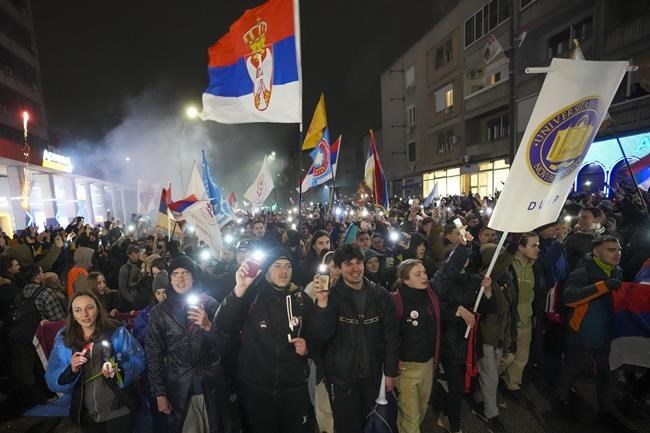
Students arrive in the Serbian industrial town of Kragujevac, to protest the deaths of 15 people killed in the November collapse of a train station canopy, Friday, Feb. 14, 2025. (AP Photo/Darko Vojinovic)
Republished February 15, 2025 - 5:20 AM
Original Publication Date February 15, 2025 - 1:21 AM
KRAGUJEVAC, Serbia (AP) — Serbia’s striking students and supporters of populist President Aleksandar Vucic were holding parallel rallies on Saturday as both marked the country's Statehood Day with notably contrasting messages.
The student-led protest is the latest in a nationwide anti-graft movement that reflects mounting calls for fundamental political changes in the Balkan state, triggered after a concrete canopy on a railway station in the northern city of Novi Sad collapsed on Nov. 1, killing 15 people.
The rally in the central industrial city of Kragujevac drew tens of thousands of people who, bedsides demanding justice over the accident, have been asking to root out rampant endemic corruption and respect for the rule of law.
Students chose Kragujevac for Saturday's rally because of its history. In 1835, Serbia was still part of the Ottoman Empire, and people in Kragujevac announced a new constitution that sought to limit the powers of the then-rulers. The date is now celebrated as the Statehood Day.
People from all over the country streamed into Kragujevac for Saturday’s gathering.
“I am here to support this student rebellion, which has grown into a civil rebellion, and to fight for the rule of law and justice in this society, so that Serbia becomes a country where life is dignified,” said a woman from Belgrade who identified herself only by her first name Teodora.
The students arrived Friday to cheers from the residents. Ahead of the protest, they organized marches in various parts of the country, encouraging people to converge in Kragujevac. Some walked, others ran or cycled. Along their journey, people greeted them with food and refreshments and offered accommodation, many crying and expressing hope for change.
Meanwhile, in Sremska Mitrovica, a small town northwest of Belgrade, Vucic is expected to recycle a traditional nationalist theme, warning that the West wants to unseat him by force and that this could lead to the breakup of the country.
Serbian authorities were set to bus in thousands of supporters from throughout the country as well as neighboring Bosnia. Some opposition activists have said they will try to prevent their arrival.
Vucic said on Instagram that his supporters wish to “defend and save Serbia from those who want to destroy it.”
The anti-graft movement is Vucic's biggest challenge in recent years. The president — who has ruled Serbia with a firm grip on power for more than a decade — and his right-wing Serbian Progressive Party have been previously accused of stifling democratic freedoms, publicly discrediting opponents and rigging elections, according to international vote observers.
The canopy disaster, widely believed to have happened due to government corruption, has become a flashpoint for wider discontent with the authoritarian rule, with university students at the forefront of the anti-graft uprising. Their determination, youth and creativity have struck a cord among people widely disillusioned with politicians.
Prosecutors have charged 13 people over the canopy fall, and protests have forced the resignation of Serbia’s prime minister. But students have said their protests will continue until their demands for full accountability are met.
In the past three months, the president has shifted between accusing the students of working for foreign powers to offering concessions and claiming he has fulfilled each of their demands. But during a trip to the Serb-controlled part of neighboring Bosnia this week, Vucic has reiterated claims about an alleged plot from abroad to overthrow him and his government.
The authorities, Vucic said, “couldn’t believe how much money has been invested to bring down the government in Serbia.” He offered no proof for the claims.
Vucic's trip to the Serb-controlled part of Bosnia was apparently designed to stress Serbian unity with the Serbs in Bosnia, where a bid to create a pan-Serb state in the 1990s’ was widely blamed for triggering a bloody war that left more than 100,000 people killed and millions displaced.
___
Associated Press writers Jovana Gec and Dusan Stojanovic in Belgrade, Serbia contributed to this report.
News from © The Associated Press, 2025